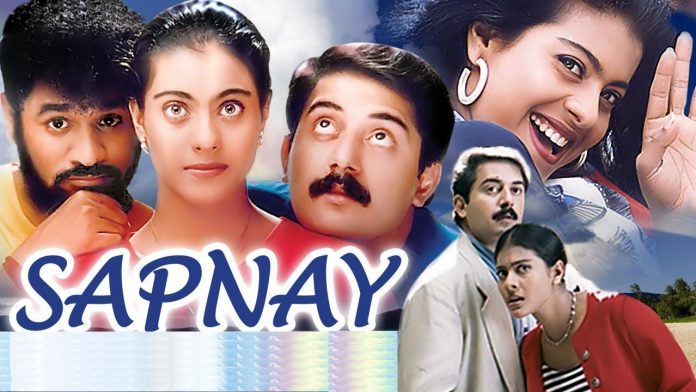SAPNAY
(Dubbed)
AVM Productions’ Sapnay, dubbed from the Tamil film Minsara Kanavu, is a love triangle with some difference. For one, two boys don’t love the same girl. One boy is in love with her but doesn’t know how to express his love, and so he takes the help of another boy to get the girl closer to him, but in so doing, the second boy and the girl fall in love. Another difference is that although the girl is the usual fun-loving kind, she is bent upon leaving the materialistic world and becoming a nun.
The unusual story is interesting, but showing too many Christian characters and too much of Christianity restricts the film’s appeal dramatically. Not only is the heroine brought up in a missionary school, even one hero is a Christian. The film has plenty of light moments but several of them are of the kind which would appeal immensely to the class audience but not at all to the masses. Further, since it is a dubbed film, the dialogues don’t come in a natural flow and, therefore, reduce the impact of the light scenes. This, coupled with the film’s mixing which is not proper, proves a handicap for the audience. Dubbing, in fact, is bad, and several dialogues are not easily comprehensible. The first half is dull.
What the drama definitely lacks in is emotions. The story had scope to accommodate emotional scenes but they are missing. An attempt has been made to infuse some sentiments in the climax but they don’t touch the heart. The climax, as it is, is over-dramatic and does not go well with the mood of the rest of the film.
Arvind Swamy acts with effortless ease. Although he gets lesser scope to entertain than the other hero (Prabhu Deva), he leaves a mark with his sincere performance. Although a bit fat, he looks very handsome. Kajol is excellent. She comes like a whiff of fresh air whenever she does on the screen. She looks pretty, dances beautifully and acts admirably. In fact, she and Prabhu Deva are the life of the film. Prabhu Deva endears himself to the audience in the role of a barber. His antics and jokes are very entertaining. V.K. Ramaswamy, Nassar, Prakash Raj and Girish Karnad lend good support. S.P. Balasubrahmaniam is good only at places; at other times, he tends to get boring and irritates.
Rajiv Menon has selected a fairly different story but his debut as a director leaves a lot to be desired. Rather than explaining things properly, he often leaves a lot to the viewer’s imagination. His narration of the subject is of class appeal. Of course, his direction also has its brilliant moments but they are few and far between, and the overall impact isn’t too nice. A sensitive subject as this required a mature handling with a lot of emphasis on a tight screenplay. A.R. Rahman’s music is the biggest asset of the film. The songs are a treat for the ears and picturisations of most of them are superb. ‘Awara bhanwara’, ‘Chanda re’ and ‘Ho…. la la la’ are wonderful songs and their picturisations thrill the heart. Picturisation of ‘Door na ja mujhse’ is extraordinary. Background music is very effective. Camerawork is brilliant. Locations are beautiful. Dialogues could have been better. Editing should have been sharper.
On the whole, Sapnay is a film for select cinemas in select major cities only, where the class audience will like it. But as there’s less for masses in it, it will meet with a poor fate in the rest of the country, and keep its distributors in the red.
Released on 1-5-’97 at Metro and on 2-5-’97 at other cinemas of Bombay thru ABC Pictures Pvt. Ltd. Publicity: excellent. Opening: very good. …….Also released all over. Opening was not upto the mark at many places.
LATEST POSITION
The debacle of MRITYUDAATA has sent shock-waves in the industry. …….This week’s SAPNAY has taken a poor start at most of the places.
Mrityudaata started dropping from 2nd day onwards. 1st week Bombay 40,98,434 (79.87%) from 14 cinemas (10 on F.H.); Ahmedabad 14,15,389 from 8 cinemas (2 unrecd.), Padra 1,51,148, Bharuch (gross) 3,38,722, Rajkot 2,88,790 from 2 cinemas, Jamnagar 1,51,219; Pune 8,96,903 from 6 cinemas (1 in matinee), Solapur 2,58,971 from 2 cinemas; Delhi 36,53,043 (81.44%) from 11 cinemas (3 on F.H.); Kanpur 3,62,920 from 2 cinemas, Lucknow 3,11,651, Agra 2,38,332, Varanasi 1,81,561 (89.21%), Dehradun 1,45,000 (69.99%); Calcutta 48,00,175 from 37 cinemas; Gaya 1,00,010 from 2 cinemas; Nagpur 5,40,069 from 6 cinemas, Jabalpur 2,24,873 from 2 cinemas, Amravati 1,79,808 from 2 cinemas, Akola 1,77,080 from 2 cinemas, Raipur 2,46,195 (50.38%) from 2 cinemas, Bhilai 2,62,620 from 3 cinemas, Jalgaon 1,00,034, Chandrapur 1,17,410, Khandwa 88,984 from 2 cinemas; Indore 3,41,270 from 3 cinemas (2 on F.H.), Bhopal 4,19,403 from 3 cinemas, Gwalior 1,16,000; Jaipur 11,60,803 from 6 cinemas, Ajmer (29 shows) 1,28,722, city record, Bikaner 2,65,909 from 2 cinemas, Udaipur 91,740; Hyderabad 33,94,977 from 22 cinemas, share 18,79,000.
……….
Ziddi 3rd week Bombay 10,12,806 (71.53%) from 6 cinemas (5 on F.H.); Ahmedabad 1,88,034 from 2 cinemas (3 unrecd.); Pune 3,98,388 from 3 cinemas, Solapur 99,528 from 2 cinemas; Delhi 15,40,599 from 8 cinemas (2 on F.H.); Kanpur 2,26,837 from 2 cinemas, Lucknow 1,79,660, Agra 1,17,650, Varanasi 1,18,839, Dehradun 87,874 (2nd 1,36,081); Rohtak 26,034; Calcutta 6,39,526 from 8 cinemas; Nagpur 1,99,461 from 3 cinemas, Jabalpur 88,688, total 4,58,213, Amravati 90,707, Raipur 1,16,201, Bhilai 45,356, total 3,40,380, 2nd Jalgaon 95,900, 3rd week 4 days 38,000; 3rd week Jaipur 2,48,768, Bikaner 52,247; Hyderabad 3,24,238.
Judaai 9th week Bombay 7,40,593 (59.57%) from 5 cinemas (2 on F.H.); Baroda 1,06,768, Rajkot 58,725, Jamnagar 57,707; Pune 1,30,421 from 3 cinemas, Solapur 39,007; Delhi 2,77,835 from 3 cinemas; Kanpur 98,314 from 2 cinemas, Lucknow 55,191, Agra 27,500; Nagpur 78,962 from 2 cinemas, Jabalpur 39,762, total 5,73,199, 8th Amravati 78,021, 9th week Akola 64,860, total 8,33,550, Raipur 53,711, Bhilai (6 days) 25,250, 4th week 6 days Wardha 27,548; 9th Indore 83,020, Bhopal 83,188; Jaipur 68,252; Hyderabad 2,07,199.
Hero No. 1 10th week Bombay 4,80,924 (69.71%) from 3 cinemas; Baroda 28,015, 9th week Rajkot (mat.) 8,200; 10th Pune 2,36,718 from 4 cinemas (1 in mat.), Solapur (mat.) 27,408; Delhi 1,81,741 from 2 cinemas; Kanpur 43,912, Lucknow 55,517, Agra 60,384, Varanasi 39,373; Calcutta 1,12,237; Nagpur 22,774, Jabalpur 50,643, total 9,54,702, Akola 32,007, total 6,03,772, share 3,44,506, 1st week Gondia 62,271; 10th Indore 52,810, Bhopal 57,348; Jaipur 1,21,219; Hyderabad 3,37,263 from 3 cinemas (2 in noon).
Raja Hindustani 21st week Bombay 4,09,531 from 4 cinemas (3 on F.H.); Ahmedabad 23,675 (1 unrecd.), 25th week Baroda 41,488; 22nd Pune 1,65,088 from 3 cinemas, 20th week Solapur (7 shows) 51,689; 24th Delhi 85,054; 25th Kanpur 26,913, 24th Lucknow 56,853, 25th Varanasi 17,343; 3rd week Kampti 33,353, 3 weeks’ total from Balaghat 2,65,000; 24th week Indore 1,21,103, 23rd Bhopal 44,713; 25th week Hyderabad 1,97,875.
GRAND OPENING OF CINEMA AT DOMBIVLI, BOMBAY
The opening of Pooja cinema at Dombivli, a distant Bombay suburb, on 1st May at the hands of police commissioner O.P. Bali was a grand affair. The expenditure incurred by the owners, Morarji Vira, Meghji Vira, Mahendra Vira, Bhanu Vira and Kekin Vira, befitted that for a marriage.
Invitee shows of Sapnay were held at 6 p.m. as well as 9 p.m. at Pooja and the recently opened twin cinema, Madhuban. Both are equipped with Dolby Stereophonic sound system. The invitees in both the shows at both the cinemas were treated to dinner too.
The Vira family played perfect hosts, receiving the guests with pedas and thandai. Everybody associated with the construction of Pooja cinema was honoured on the occasion with trophies.
TAX EXEMPTION FOR MARATHI FILMS
Maharashtra revenue minister Narayan Rane announced in the legislative council this week that Marathi films would be granted 100% entertainment tax exemption. Maharashtra chief minister Manohar Joshi has also promised to increase the subsidy payable to Marathi film producers to Rs. 15 lakh.
FIRST AIR-CONDITIONED CINEMA IN BARODA
Vihar cinema in Baroda has installed an air-conditioning plant and becomes the only cinema in Baroda district with a full air-conditioning facility. Sapnay opened at the air-conditioned cinema on 2nd May.
KETAN ANAND’S WIFE COMMITS SUICIDE
Producer-director Ketan Anand’s wife committed suicide on 26th April at her residence at Chembur, Bombay. The reason for the suicide is not known.
‘SAPNAY’ PREMIERE
A premiere show of Sapnay was held on 30th April at Metro, Bombay. The three lead artistes of the film — Arvind Swamy, Kajol and Prabhu Deva — attended the show.
DTS SOUND SYSTEM FOR CINEMA AT AKLUJ
Dr. Sunil Patil, owner of Shriram cinema, Akluj (Maharashtra), has gone to Dubai and Singapore for buying DTS digital sound system for the cinema. The cinema is already equipped with Dolby SR sound.
DTS SOUND AT SMRITI, INDORE
Smriti cinema in Indore, owned by the Kasliwals, will instal DTS sound system. Border will be released at the cinema after the installation of the sound system. This will be the third cinema in Indore to have DTS sound system, the earlier two being Sapna and Sangeeta.
DTS AT NOVELTY, LUCKNOW
Novelty Talkies, Lucknow, has installed DTS Stereophonic sound system. It is the first cinema in Uttar Pradesh to have installed the sound system.
JAIPAL REDDY NEW I & B MINISTER
Sudini Jaipal Reddy is the new information & broadcasting minister in the government of prime minister I.K. Gujral. He was sworn in as cabinet rank minister on 1st May and succeeds C.M. Ibrahim.
O.P. GOYAL STABBED
C.I. distributor O.P. Goyal was stabbed on 29th April in Indore while he was leaving Sapna cinema for his office. He was dragged out of the car and stabbed at four or five places by unidentified persons. He is out of danger. Just recently, Goyal had met with a car accident.
YOU ASKED IT
Can a sequel of a hit film succeed in India?
– Why not? There’s no hard and fast rule that a sequel will not succeed. NIGAHEN, the sequel to NAGINA, may have bombed, but that does not mean, sequels can never do well.
After Mrityudaata and Koyla, what, according to you, should be a reasonable price for big films?
– 1.5 to 1.75 crore should be the upper limit for any film. If such films can take a bumper initial, the back-breaking losses will at least be averted.
When everybody says that the ‘film line’ is a ‘small line’, how is it that reports of big disasters don’t come in circulation before their release?
– Firstly, the correct judgement about a film can often not be made unless it is viewed in totality. Secondly, big filmmakers are extra-careful that their reports don’t leak out. And finally, the public is the best judge as far as reports of films go.
The Industry Must Give 5 To 10 Years’ Time To Judge ABCL
– AMITABH BACHCHAN
A day after the premiere of Mrityudaata in Jaipur, a group of Bombay journalists who had been there to attend the premiere, got some time to talk to Amitabh Bachchan in his suite at Rajputana Palace Sheraton. The comeback hero spoke on topics ranging from his comeback film, Mrityudaata, to corporatisation to stars of the day.
On ‘Mrityudaata’:
Amitabh Bachchan did not express his own opinion about the film as he claimed that he had not seen the whole film in one sitting, but had seen it in parts at different times. He admitted that he had liked the theme when it was being planned and had asked Mehul Kumar to go ahead. He said, he never interfered in Mehul’s work and he made it clear that Mrityudaata was, all in all, a Mehul Kumar film.
Amitabh clarified that only a few producers, and not many, as is generally believed, had approached him for making his comeback film, and of them, he selected two — Indra Kumar and Mehul Kumar — for ABCL productions. They persisted whereas others simply proposed, he explained. When it was time to launch the films, muhurt of Indra Kumar’s film was performed first. However, it couldn’t make any progress as Indra Kumar was busy in completing his Ishq. Thus, Mehul got a chance to launch and complete ABCL’s Mrityudaata at breakneck speed. One major point in favour of Mehul Kumar, according to Bachchan, was that he himself was a producer-director and so understood the problems of producers, which helped in economising production cost. ABCL being a new company, such a person was needed for its initial productions, said Amitabh. And Mehul had given no cause for complaint. Amitabh informed that shooting of Indira Kumar’s film would start in two months’ time and it would be completed within six months.
On ABCL:
Amitabh Bachchan said, he launched ABCL after giving great thought and studying the entertainment industries of the world. He agreed that only appointing MBAs to run his company was of no use, but, he felt, if they were given lessons in film business, they could be very beneficial to the industry. “It is a matter of give-and-take,” he added. “We have to learn something from them, and they have to learn something from us. Only then can the corporate body succeed.” Supporting his corporatisation, he said, “Corporate body is the need of the hour. Our Indian film industry is very small. In the age of globalisation, foreigners are ready to invest money in our country and if they get the opportunity, they will not hesitate to grab it. The American corporate bodies like 20th Century Fox, Paramount etc. are so rich that even one section of these companies may have more money power than our entire film industry. There was a time when, even in India, our major studios were running the film business like corporate bodies, but with the star system gaining popularity, the studios fragmented. Again, attempts are being made in India to progress with corporatisation. Like in Hollywood, in India too, producers-directors can make films under any corporate body in business-like manner.”
“ABCL is only two years old and it has spread its wings in audio, television, film production, distribution and some other branches of the entertainment industry. It has earned profits in some and incurred losses in others. At present, because of differences with Multichannel, with which ABCL was looking after the marketing of television programmes, this section is lying low, and efforts are being made to give it a new lease of life. As far as film productions are concerned, two films have been released, and one of these (Tere Mere Sapne) has succeeded. Naam Kya Hai and Saat Rang Ke Sapne are almost ready, with only two-three days’ shooting remaining to be done. Major Saab, another Amitabh Bachchan starrer, will be 70% complete after the current shooting schedule being held in Pune. All these films are likely to be released in 1997 itself. A turnover of Rs. 80 crore, just within two years, is not a mean achievement.” Amitabh, reacting to comments that ABCL was in the red, said, “People must give at least five to ten years to assess the success or failure of ABCL.”
Words of Appreciation:
Amitabh was very appreciative of another corporate body — Plus — and music business baron Gulshan Kumar. He said, the business acumen of Gulshan Kumar was masterly. He had captured the music market even in remote corners of the country through his ingenious method of handing over distribution to such people as bus operators, paanwalas and other people who are in contact with street people all the time.
On Current Stars:
Even while discussions were on, the television set in the room was showing the countdown show, BPL Oye. As Govinda appeared on the scene in a song from Hero No. 1, Amitabh remarked, “He (Govinda) is outstanding.” Soon after, when Kajol appeared in a song from Sapnay, he said, “She is the most natural actress.” About his own son, Abhishek, he didn’t say, he would take up acting. “He has just joined ABCL and is looking after some of the work.”
– JAGAT GUPTA
Prices, More Than Films, Are Failing
The back-breaking Mrityudaata and the loss-making Koyla have shaken the confidence of the trade. It is not the first time that two big films, released one after another, have failed. But it is the first time that two highest-priced films of their times have flopped. Although the losses of the two films cannot be compared, what is similar in the non-success of Koyla and the debacle of Mrityudaata is that their prices were too high and did not match their costs of production. The repercussions of the flopping of these two films will be felt in the forthcoming releases when exhibitors don’t come forward with deserving MGs, having paid undeserving MGs or advances to the two films.
If producers have been unreasonable in demanding crazy prices, over-enthusiastic distributors have also been rather indiscriminate in acquiring films at unbelievably high prices. Agreed, everything, which is in demand, comes at a premium. But such a heavy premium?
Businesses of films like Hum Aapke Hain Koun..!, Raja Hindustani, Dilwale Dulhania Le Jayenge and Karan Arjun are used as pointers by producers when they quote fancy prices for their films. But in the last almost four years, we’ve had just four such mega hits. It is not as if every second or third film is hitting the bull’s eye. Nor has cost of production gone up to such an extent that crazy prices should be demanded. It is actually the unsatiable greed of the producer to get quick-rich that prompts him to demand prices which have no relation whatsoever to the actual cost of production. Distributors also sometimes do not give proper accounts and the due overflow to the producers, which prompts the latter to sell their films at unrealistic prices. The logic of the producers is that they are collecting the potential overflow in advance. Assuming that their logic is not wrong, they must then willingly refund the excess price to their distributors if the film fails to cover the unrealistic part of the price. Then there are some producers who, in fixing the ratios of their films, unfortunately behave as if there will be no tomorrow or as if they will make no film after their current proposal. Yes, proposal makers they are, more than filmmakers.
It is shocking, to say the least, that distributors should be paying so much for films after losing so heavily in previous projects. The psychology of the distributors may be funny but it isn’t difficult to understand. A distributor is living under the constant fear that if I don’t buy this film, some other distributor might buy it. It is this fear of a film going to another which prompts a distributor to pay sky-high prices even while fretting and fuming at them. But why this insecurity? Why pay an unreasonable price not because you fancy a film but because you are scared that the film may catch the fancy of another? No sensible business can be conducted on the basis of what another thinks is the worth of a film. It never was and never can.
This is not to say that film prices can never be more than a given limit. No, each film is a project in itself and its price must be governed by the laws of demand and supply. But let not the distributors think that just because there is short supply of potential hits, any price is justified for such films, for the simple reason that it is difficult, if not impossible, to predict which film constitutes a potential hit. No banner, whatever its past record, and no director, whatever the business of his last film, can ever guarantee that his next film will be a super-hit or, for that matter, even a success. Then why charge the price of a blockbuster? As for demand, the same logic applies. There is definitely a demand for hits but can anyone guarantee even a success?
Then why should prices, said to be governed by the economic laws of demand and supply, be so unrealistic that in some cases, it is the prices which ultimately flop, not the films?
– Komal Nahta
3-E
Education-Entertainment-Enlightenment
One Man’s Food, Another Man’s Poison
A hit in one language does not guarantee that the same film will also click when dubbed in another language. This has been proved a number of times, and the latest example is that of Raja Hindustani. This super-duper hit was dubbed in Telugu as Premabandham but the dubbed version is as big a disaster as the original was a hit. Released on 21st March in Andhra, the Telugu version has left its distributors and others connected with it disappointed. Its dubbing is said to be of poor quality and so are the dialogues in Telugu. Even the lyrics are reportedly sub-standard. Now that the dubbed version has bombed, the objection which had been raised by the talented director of the film, Dharmesh Darshan, to its dubbing without his knowledge, makes sense. Dharmesh was apprehensive about the dubbing quality and had, even before the Telugu version could hit the screens, expressed fear that if it did not do well, it would spoil his reputation in the Telugu film market. Dharmesh’s fears have proved right and, if today, the film’s producers may be regretting their hasty decision, Dharmesh must be shedding tears at the fate of his ‘baby’.
Minor Change
A flop film brings out the bitchiest best of the trade people. And bigger the flop, bitchier the comments of the trade.
Like, for instance, a Gujarati film producer remarked after the bombing of Mrityudaata: “It wasn’t only Amitabh’s comeback film. It was also Mehul Kumar’s comeback vehicle. The director will now have to come back to making Gujarati films only.” Another wag bitched, “Looking to the cold response to Amitabh Bachchan in Mrityudaata and the not-so-exciting initial of the film, the title of ABCL’s next film should be changed from Major Saab to Minor Saab!”
Wetting The Wall
And this one, just for a laugh.
This was when Salim-Javed’s Deewaar, which went on to become a blockbuster, was being made. The title had not been finalised. When Deewaar came up as one of the suitable titles, somebody from the unit thought, it was too dry a title and expressed so. Writer Javed Akhtar, who has a wonderful sense of humour, said, “Title dry lagta hai? Koi baat nahin, film ka title Geeli Deewaar rakh dete hain!”





























